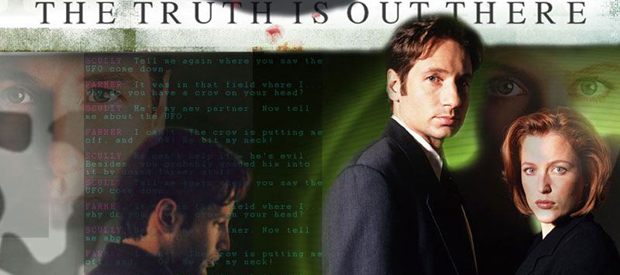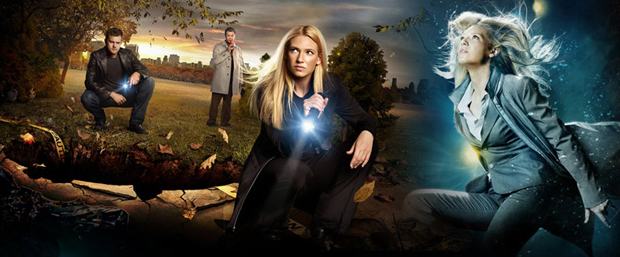I was a geeky teenager in the 1990s, so I could hardly avoid being at least casually familiar with the X Files. But, for whatever reasons, I never really dug into the show at the time. I watched stray episodes here and there, had a basic idea of how the show worked, knew some of the major recurring characters, but never really got into the major plot arcs or followed the show regularly. One of the things I’ve been doing lately is catching up a bit in my off hours; thanks to the wonders of Netflix Watch Instantly, I’ve been going through the early seasons. One of the things that going back and watching it has reminded me of is just how really influential the X Files has been on the development of pop TV. It’s obvious with Fringe, of course, or with lesser imitators like EUReKA and Warehouse 13. But you can also see interesting points of contact with more conventional spaceship fare like Stargate SG-1,[] or in other gimmick-based buddy-cop procedurals like Bones.[] Just looking at it structurally, and sticking with the sci-fi for right now, since the X Files hit it big, it’s been pretty easy to find science fiction that revolves around a heroic team of scientists and investigators or soldiers, working for a special branch of government security, and constantly in search of a secret — hidden — truth in a universe much larger than anyone in civilian life dares to imagine.
Like the X-Files, it’s important that all these other shows are supposed to take place in the present day and the real world we’re familiar with, not in a spaceship future or in a galaxy far, far away. Our heroes have to live in our world but they are always encountering marvels and dangers from this much larger universe.[]
Shows like Fringe and SG-1 follow in the X Files tradition of treating the conspiracy theories and fringe communities they riff on with ironic affection. Within the show, these theories are reality after all; just seen as through a glass, darkly, by those who are weird enough and obsessed enough to catch the right rumor or grasp the deeper truth.[] The fact that all this is happening in the here and now of our real world makes the paranormal both fascinating and poignant and a bit disturbing; there’s a whole extraordinary universe beyond our ken, and in spite of our lingering doubts about conventional wisdom, we just really don’t know about it. Specifically, we don’t know anything about it because government security agents have made a concerted effort to keep the whole thing secret from us. The shows pretty much always have a longer arc above and beyond the individual episode’s mystery; the longer arc is always caught up in the fact that this mind-blowing universe might not be secret anymore. (Either the truth is about to be revealed, or some world-threatening crisis is looming that nobody but the heroes and villains have even begun to imagine.)
But of course if you are looking at obviously similar things, it’s usually more interesting to talk about where and how they differ. Usually the potting of Fringe that you hear is that it’s X Files without the aliens,
but that’s only a difference
in the least interesting way possible. Getting back into X Files after all this time has reminded me of what the real, big difference between the X Files and Fringe, or all the other secret-knowledge shows that have come along, is. In the X Files, Mulder and Scully work for the government, but they are constantly trying to expose a massive government conspiracy that’s hiding vital truths. The Truth Is Out There,
both about the aliens and about the government cover-ups and we’re supposed to be fighting for it — against shadowy villains well-placed within a security state that obscures, manipulates, and destroys evidence in order to keep mind-blowing truths secret and lie to people for their own good,
to keep them from finding out truths that the security state decides they Aren’t Ready For.
What about the bizarre, world-threatening Pattern investigated in Fringe? What about the secret history and vast alien universe of SG-1? In every single post-X-Files esoteric sci-fi show I can think of, the team not only works for the government; they’re part of the conspiracy; they’re in on the cover-up. Fringe Division investigations routinely end with Broyles, acting as both boss and fixer, telling the team, with a wink and a smile, what this week’s cover story is; in SG-1 the team themselves often have to take extraordinary steps to destroy damning evidence or convince witnesses to remain silent about alien encounters, hyperadvanced technology, and even our own origins as a race, even though the lies that they tell constantly leave everyone outside of a tiny military-government cabal oblivious to the constant, overwhelming danger of enslavement or extinction that looms over every one of us.[] When they think of the X Files, everyone remembers Trust No One
; there’s another early episode of the X Files about covered-up government experiments on human subjects, where Mulder and Scully briefly get into a conversation with a local dairy farmer about rBGH; Scully insists that he shouldn’t worry, because rBGH has been declared safe, and the farmer snorts back Where’d you hear that from? The gov’ment?
In the world of Fringe and SG-1, the heroes of the story are the gov’ment, and they expect the rest of the world to believe what they hear when they declare the world safe — nothing to see here, everything’s alright. Even though they know for a fact that it’s all a massive lie. The Truth Is Out There — and we’re going to make sure you’re not ever going to find it.
Of course, I watch Fringe and SG-1 and all that because they’re fun shows — sometimes even really good shows — and I enjoy them a lot. I don’t know if there’s any broad sociological lessons to be drawn here; pop culture is weird, and niche TV writing is even weirder. But I do think it’s hard not to notice the fact that the X Files first came on the air in September 1993, just two years after the fall of the Soviet Union, and just half a year after the massacre at Waco, while the U.S. intelligence aparat and the military-industrial complex were still reeling from the collapse of the Junior G-Man mindset and a very real possibility that they might be judged necessary evils that were no longer necessary. The story of war and intelligence politics since the mid-90s has been the story of the National Security State trying to develop a convincing rationale to justify its own continued existence in a world without hostile superpowers — to revive the state of perpetual emergency and the Cold War mindset that justified it by looking the other way and trusting in the good faith of the chain of command — a sort of cultural reconstruction that they never really accomplished in any stable way until the unveiling of the Great Patriotic War on Terror. Keeping that in mind, it’s interesting to be reminded that Fringe is a story that basically takes place in the fictional world of the X Files — but while Mulder and Scully spent about half of the X Files acting as rogue agents, in Fringe, the Bishops and Agent Dunham are basically working for the Smoking Man. It’s hard not to see just how much it is a show of the Bush-Obama decade.





